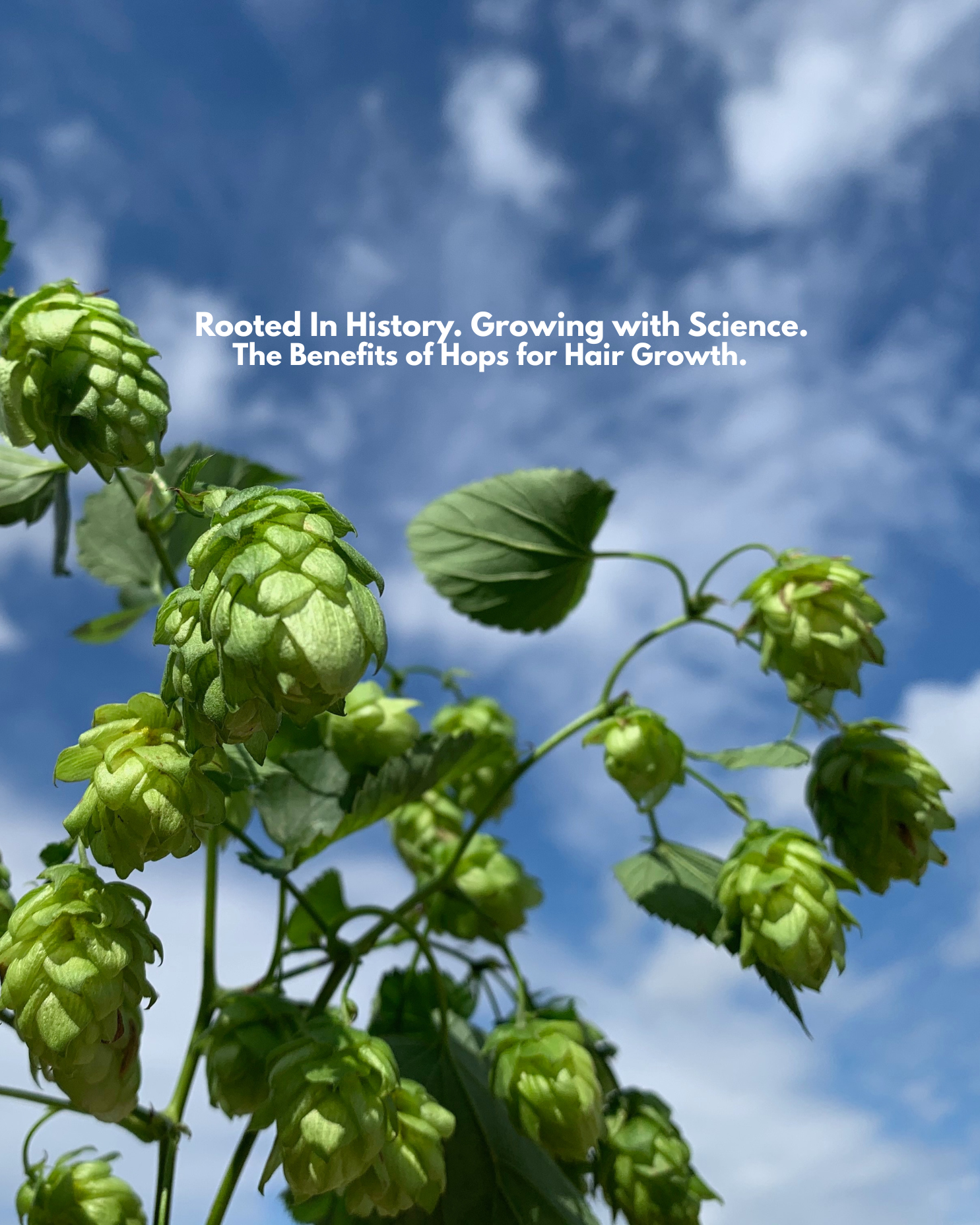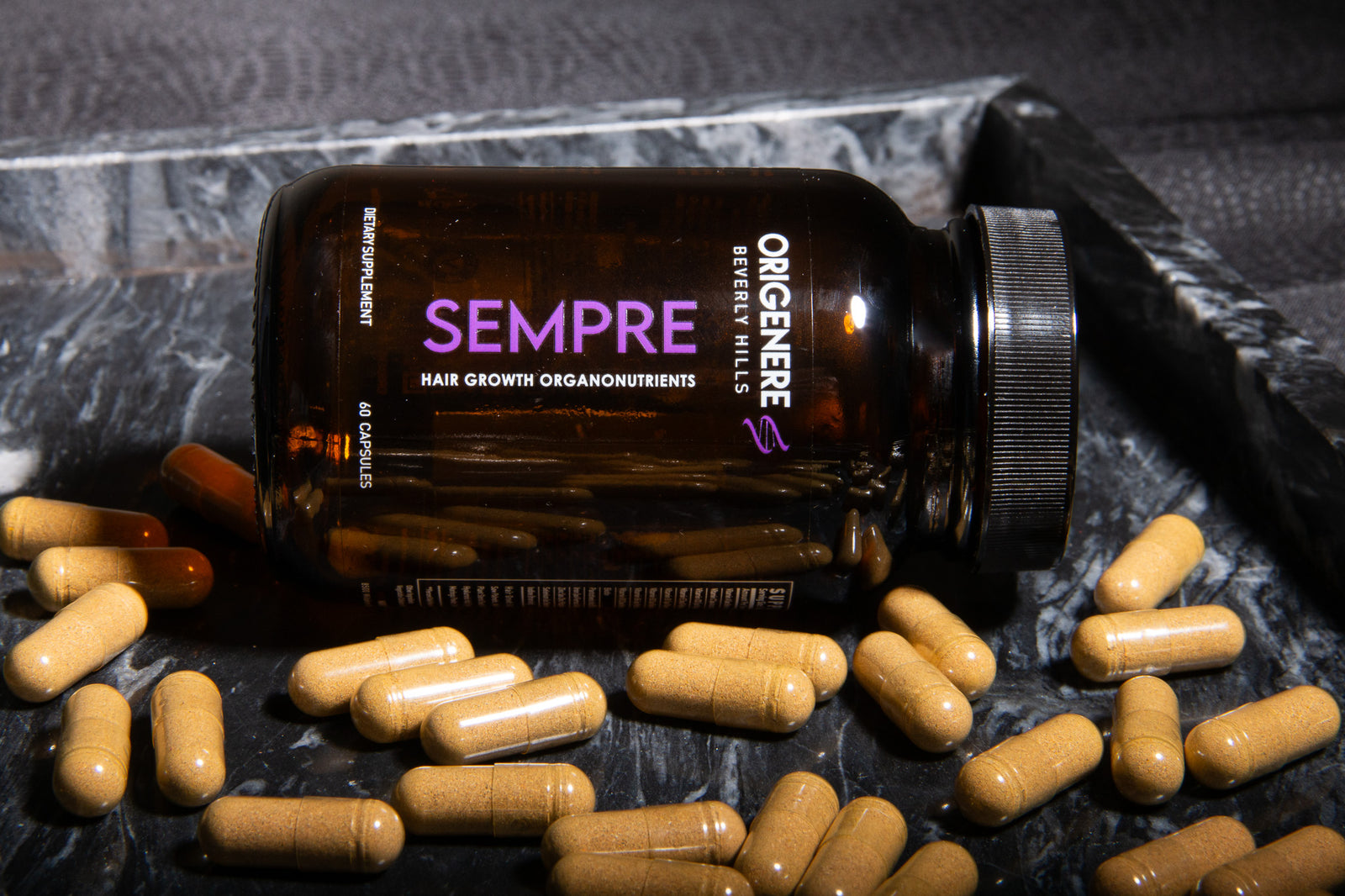The Science Backed Benefits of Hops for Hair Growth

Summary of Hops Benefits for Hair
-
Natural DHT-Blocking Properties Support Hair Growth
-
Rich in Antioxidants That Protect Follicles
-
Anti-Inflammatory Activity Soothes Scalp Conditions
-
Enhances Scalp Circulation
-
Flavonoids Support Collagen Synthesis and Hair Structure
-
Antimicrobial Activity May Help Reduce Dandruff
HOPS // Scientific Name: Humulus lupulus
-
Humulus: From Latin humulus, meaning "small plant near the ground."
-
Lupulus: Latin for "little wolf," as hops tend to overtake other plants.
-
Genus: Humulus
-
Family: Cannabaceae
The Plant
A perennial climbing plant with cone-like flowers called strobiles, hops thrive in temperate regions of Europe, Asia, and North America. Though widely cultivated for brewing, the plant contains prenylated flavonoids, bitter acids, and essential oils that contribute to its growing use in natural hair and scalp care. These compounds offer powerful antioxidant, anti-inflammatory, and hormonal-balancing effects—making hops an emerging botanical in the search for healthier hair.
Long before their brewing fame, hops were used in traditional medicine. Monks and herbalists prized hops for their calming, cleansing, and preservative qualities—often steeping them into teas or applying them topically for skin and scalp conditions.
Historical Uses
Since the 9th century, hops have been used in monastic and herbal medicine to treat restlessness, inflammation, and skin irritation. In the Middle Ages, German abbesses applied hops infusions to soothe inflamed scalps.
By the Renaissance, hops were cultivated not only by brewers but also in noble estates and monastery gardens across Europe, valued for their use in medicinal rinses, skin elixirs, and beauty tonics. Their ability to calm inflammation and preserve natural remedies made them a staple in early European scalp care.
In traditional Chinese and Ayurvedic medicine, hops were used to "cool the blood" and calm excess heat, often associated with skin flare-ups. An 1820 British pharmacopoeia listed hops as a remedy for scalp eruptions and skin itching. Though topical use declined over time, recent research has revived interest in the benefits of hops for hair growth and overall scalp wellness.
Modern Day Use
-
Scalp calming formulas
-
Anti-dandruff hair rinses
-
Natural hormone-supporting actives
-
Botanical DHT-blockers
-
Antioxidant-rich scalp serums
-
Skin-balancing face and hair masks

What Are the Benefits of Hops for Hair Growth?
When it comes to scalp and hair care, modern science supports the many benefits of hops for hair growth through a variety of mechanisms, including hormonal balance, inflammation control, antioxidant activity, and improved blood flow.
Natural DHT Blocker
Xanthohumol, one of the most studied bitter acids in hops, acts as a natural 5α-reductase inhibitor, blocking the conversion of testosterone into dihydrotestosterone (DHT). This is significant because excess DHT is one of the primary drivers of follicular miniaturization in androgenetic alopecia.
Antioxidant Shield for Follicles
Hops contain humulone and lupulone, potent antioxidants that defend against free radicals and oxidative stress. This is vital for scalp and hair follicle health, as oxidative damage can impair dermal papilla cells—the very cells that regulate hair growth.
Studies suggest that these compounds significantly reduce lipid peroxidation and DNA damage in dermal tissues.
Anti-Inflammatory for Scalp Health
Inflammation is a common but overlooked cause of hair thinning. Hops extract helps reduce inflammatory markers like TNF-α and IL-6 while calming irritated scalp skin.
Some studies found that humulone modulated NF-κB activity—a key pathway in inflammatory skin and scalp disorders like seborrheic dermatitis. However more studies are needed to establish its direct role in the treatment of seborrheic dermatitis in humans.
Enhances Scalp Circulation
The flavonoid 8-prenylnaringenin promotes vasodilation by increasing nitric oxide, boosting microcirculation in the scalp. This enhanced blood flow brings oxygen and nutrients to hair follicles, supporting the active growth (anagen) phase.
Hormonal Balance and Female Hair Health
Another reason behind the benefits of hops for hair growth lies in their natural phytoestrogens—particularly 8-prenylnaringenin, one of the most potent plant estrogens known. This flavonoid may help support hormone-related scalp concerns, such as postpartum shedding or menopausal thinning, by creating a more balanced environment for follicle renewal.
Flavonoids That Support Collagen
Hops are rich in quercetin and kaempferol, two flavonoids that stimulate collagen production and protect dermal structure. Collagen is vital for maintaining the strength and integrity of the hair’s anchor within the skin.
Antimicrobial & Anti-Dandruff Effects
Hops also help balance the scalp microbiome. Compounds like lupulone and myrcene exhibit antimicrobial activity that can help reduce Malassezia, the yeast responsible for many dandruff and scalp irritation issues.
Some studies suggest topical hops extract reduces dandruff symptoms in as little as two weeks.

Phytonutrient Profile of Hops
The benefits of hops for hair growth stem from its impressive portfolio of naturally occurring compounds:
-
Xanthohumol: A powerful bitter acid that blocks 5α-reductase and supports healthy hormone balance, reducing DHT’s impact on hair follicles.
-
Lupulone: Acts as an antimicrobial and antioxidant, protecting follicles from inflammation and microbial stress.
-
8-Prenylnaringenin: A phytoestrogen that boosts scalp circulation, helping to supply hair roots with oxygen and nutrients.
-
Kaempferol: Known for its anti-aging effects, this flavonoid supports collagen synthesis to strengthen the scalp and dermal tissue.
-
Quercetin: Fights oxidative stress while reducing inflammation—both critical for follicle survival.
-
Humulone: A bitter acid that calms scalp irritation and contributes to a healthier scalp environment.
-
Myrcene: A soothing terpene that helps other nutrients absorb while offering calming and antimicrobial effects.
Dermatological and Cosmetic Properties of Hops
In dermatology, hops are used for their ability to:
-
Calm sensitive, itchy scalps
-
Balance sebum for oily-prone scalps
-
Protect and preserve collagen around the follicle
-
Rebalance scalp microbiota through antimicrobial effects
Suffering from hair loss? You’ll find hops in high-end scalp serums, calming shampoos, leave-in scalp mists, and skin-hair hybrid treatments—especially in formulations targeting inflammation or hormone-related hair concerns.
Skincare Routine and Inflammation Relief
Beyond hair care, hops are gaining traction in the world of skin health. The female flowers of the Humulus lupulus plant contain bioactive compounds that make them a standout botanical for any science-backed skincare routine. Rich in antioxidant properties and essential nutrients, hops may help reduce signs of skin aging, support skin elasticity, and protect against free radical damage.
Their natural anti-inflammatory and antimicrobial properties make hops a compelling choice for those with sensitive skin or acne-prone complexions. By calming skin irritation and supporting moisture balance, hops offer a gentle, natural approach to improving overall complexion.
Notably, hop extract is also being researched for its potential role in reducing wrinkles and enhancing skin barrier repair. Used in serums or face creams, it can complement the effects of vitamin E and chamomile while offering a distinctive aroma linked to its botanical origin.
A Sustainable Star in Clean Beauty
As modern science and sustainability intersect, hops are gaining attention beyond their therapeutic effects. Thanks to their natural antimicrobial and preservative properties, hops are being used in eco-conscious skincare and haircare as a replacement for harsher synthetic ingredients.
They’re also being explored for use in biodegradable beauty packaging and upcycled botanical formulations, aligning perfectly with today’s movement toward sustainable beauty practices.

Interesting Fact: Beer Rinse for Better Strands?
For centuries, women in Central and Eastern Europe rinsed their hair with beer to enhance natural shine and volume. It turns out they were on to something—scientific evidence suggests that the bitter acids in hops acidify the hair’s surface, sealing the cuticle and reducing frizz. This natural low-pH rinse is similar to what modern conditioners aim to achieve.
Safety and Contraindications
While the benefits of hops for your strands are impressive, a few safety notes apply:
-
Pregnancy & Hormonal Sensitivity: Hops contain phytoestrogens like 8-prenylnaringenin, which may affect estrogen levels. Avoid during pregnancy, breastfeeding, or if managing hormone-sensitive conditions.
-
Allergies: Those allergic to plants in the Cannabaceae family (e.g., cannabis, hemp) may also react to hops.
-
Sedative Effects: Hops are mildly sedating when ingested and may enhance the effects of CNS depressants.
Topical use in moderation is generally well-tolerated but if you notice any adverse reactions or side effects, stop use immediately and contact your health care provider.
Ways to Use Hops for Hair
There are several ways you can incorporate hops into your hair care routine for healthy hair growth:
-
Scalp Tonics or Leave-In Mists: Look for botanical formulations with hops extract, particularly those standardized to xanthohumol.
-
Herbal Hair Rinse: Steep 2 tablespoons of dried hops flowers in hot water. Let cool and pour over clean hair after shampooing.
-
DIY Oil Infusion: Combine dried hops flowers with jojoba or grapeseed oil and infuse for 2–4 weeks. Strain and apply to the scalp 1–2x weekly.
Final Thoughts: A Botanical Powerhouse Reimagined
Once prized for beer, hops are now earning a place among the most promising botanicals for scalp care and follicle support. With their unique ability to block DHT, calm inflammation, fight microbial overgrowth, and stimulate circulation, the benefits of hops for hair growth are both ancient and newly validated.
As modern science continues to rediscover the power of plants, hops remind us that nature often holds the answers—especially when it comes to restoring our roots.
Sources:
Pereira OR, Santos G, Sousa MJ. Hop by-products: pharmacological activities and potential application as cosmetics. Cosmetics. 2022;9(6):139. https://www.mdpi.com/2079-9284/9/6/139
Becker L, Boyer I, Bergfeld WF, et al. Safety assessment of hops as used in cosmetics. Int J Toxicol. 2024;43(1_suppl):5S-29S. https://pubmed.ncbi.nlm.nih.gov/38126727/
Chen W, Becker T, Qian F, Ring J. Beer and beer compounds: physiological effects on skin health. J Eur Acad Dermatol Venereol. 2013;28(2):142–150. https://onlinelibrary.wiley.com/doi/abs/10.1111/jdv.12204
Korpelainen H, Pietiläinen M. Hop (Humulus lupulus L.): traditional and present use, and future potential. Econ Bot. 2021;75:302–322. https://link.springer.com/article/10.1007/s12231-021-09528-1
Liu M, Hansen PE, Wang G, et al. Pharmacological profile of xanthohumol, a prenylated flavonoid from hops (Humulus lupulus). Molecules. 2015;20(1):754–779. https://www.mdpi.com/1420-3049/20/1/754






Leave a comment